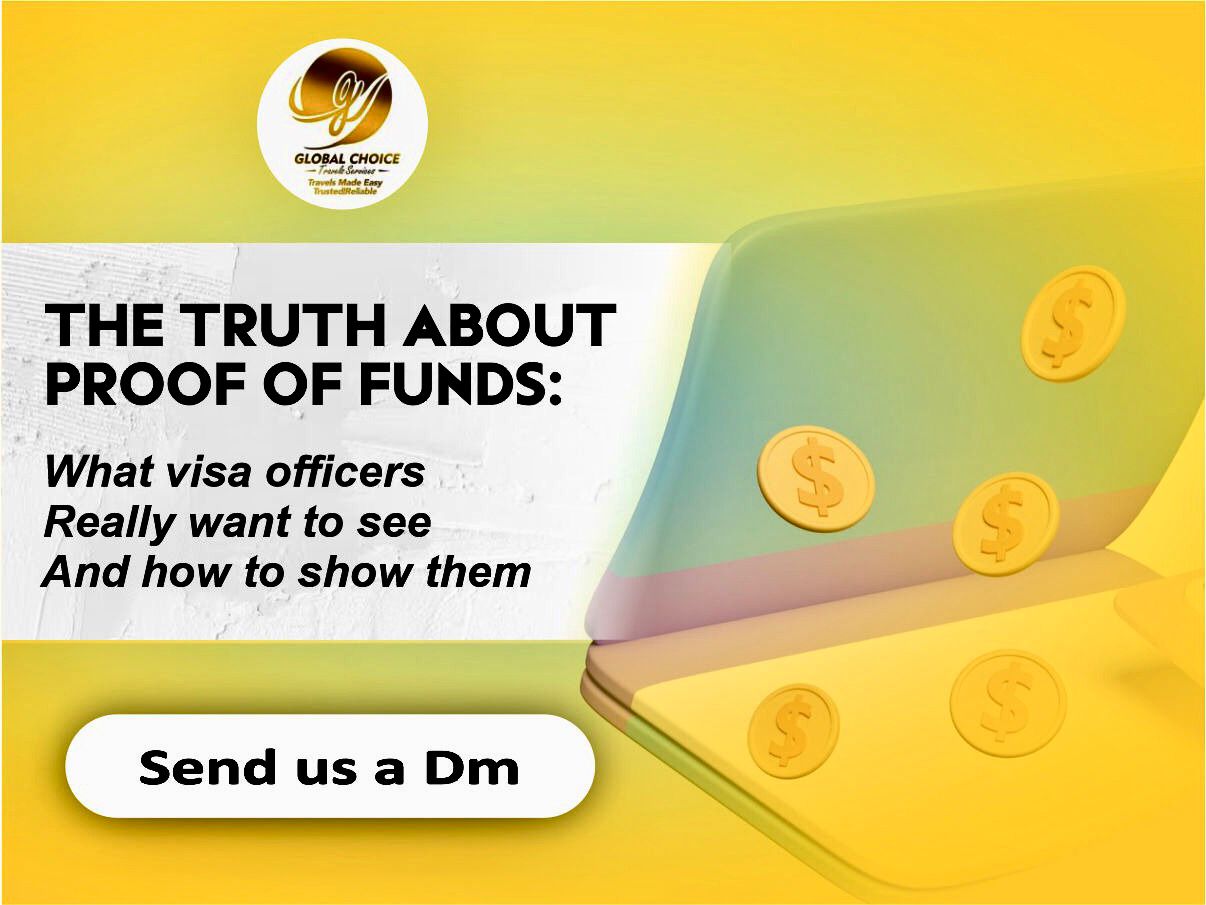Undeniably, the financial burden of living and studying abroad is substantial, often creating financial challenges for numerous students. Western nations, which are popular destinations for Nigerians seeking education and improved living standards, generally welcome international students, including those from Nigeria. However, these countries also implement strategies to prevent being overwhelmed by immigrants.
For this reason, proof of funding is necessary. You’ll need to prove to the relevant immigration officers that you deserve the privilege to live in the country you are applying to. Proof of funds will help you demonstrate to them that you have sufficient funds to support yourself during your stay. This will indicate strong ties to your home country. All aspiring international students must demonstrate that they have enough financial means to support themselves while abroad. They must be able to pay their tuition and fees, living expenses, and the costs of any dependents, while they are studying, you must either provide proof of funds on your behalf or through sponsorship (such as a relative paying for your studies) to satisfy the Proof of finances required for your student visa or study visa). It is important that you check directly with the consulate, as this may vary by country and agency, but here are some things to consider when going for a visa interview.
What is the Minimum Fund Requirement?
For US student visa applications, bank statements are essential to prove financial capability. The statements must clearly show enough money to cover the cost of a year's tuition and living expenses for international students studying in the USA. This requirement ensures that applicants can financially support themselves throughout their academic journey.
Sponsorship
Individuals seeking to pursue studies in the United States, but who may face financial constraints, may request sponsorship assistance. A sponsor, potentially a family member, can contribute to the educational expenses of numerous international students. Sponsors can be located domestically or internationally. Numerous scholarships specifically designed for international students are readily accessible. Prospective students should research current overseas scholarship opportunities. Applicants must ensure they meet the eligibility criteria. Requirements may include demonstrating a positive attitude toward education and future career prospects, as well as a strong commitment to academic excellence, among other factors. If sponsored by a U.S. citizen, the student must complete the I-134 Affidavit of Support Form. The sponsor is responsible for covering any expenses the student is unable to cover.
Students who are sponsored by funds originating outside of the US should verify if the respective country imposes any restrictions on fund transfers. Any identified restrictions must be supported by evidence demonstrating the student's ability to access these funds throughout their study period.
What the Visa officer wants to know
Funding is a critical component of the student visa interview process. Students must articulate their financial plans for tuition and living expenses to the visa officer. Therefore, a thorough understanding of your sponsors is essential, as it enables the visa officer to comprehend the relationship between you and the sponsor. This is because you must present a clear narrative to the visa officer, enabling them to understand the rationale behind a person’s financial support for your tuition or living expenses. Cultural nuances must also be considered. For example, while parents are commonly accepted as sponsors in some cultures, such as in the United States, other family members, like aunts or uncles, may be viewed differently. Therefore, it is your responsibility to demonstrate to the visa officer that Nigerians maintain strong bonds with both their extended and nuclear families; consequently, an aunt or uncle can serve as a capable sponsor. Providing a detailed explanation of the relationship between you and this distant family member and the reasons for their support may be highly beneficial.
To clarify, when inquired about a sponsor, the question intends to assess the justification for visa issuance, focusing on your financial standing. The query extends beyond the individual listed on forms such as I-20 or DS-160, encompassing your entire financial situation. Therefore, provide comprehensive details regarding your financial resources, whether it be personal savings, parental support, collective family contributions, extended family assistance, a third-party sponsor, or organizational backing, aiming to present a complete picture for visa consideration.
Three other things Visa Officers check for:
Visa officers typically have limited information about applicants until immediately before the visa interview. This usually occurs within approximately 30 seconds as the applicant approaches the desk, while the officer retrieves and reviews the application, such as the DS-160 form, from top to bottom, focusing on the most critical questions. These questions include:
- How long are you going to the USA?
- What type of visa are you applying for?
- Do you already have family in the USA?
- Have you been denied a visa before, and what do you think is the reason for the denial?
- What is your job, and how much do you make a month?
- What is your family situation? Are you married, and do you have kids?
They are evaluating all the provided information to determine trustworthiness. While it may seem like a substantial amount of information to review within a limited timeframe, visa officers typically interview between 100 and 150 individuals daily. As such, they have developed proficiency in rapidly assessing information and identifying the most critical factors for visa approval. The top three areas of focus are:
Whether or not you have been denied a visa before. This is very important because, whether or not you have been denied a visa before, your last interview will play a very important role in whether or not you can overcome the situation this time. If you have been denied more than once, all of those notes will be in the computer system for their perusal. This is why it is really important to try to minimize visa denials and to prepare for your interview, because if you are not prepared, sometimes officers can deny your visa in as little as 30 seconds. So, you want to be prepared. You know what questions may come up, and you know exactly how to answer the questions.
Your clearances are the second thing they look for. This is because when you apply for a visa, it goes into all sorts of different databases to check on your prior criminal history. Sometimes those things will pop up, and if they do, the visa officer will want to ask you questions about what happened to see what you have to say for yourself, and whether or not you still qualify for a visa. Lastly, they want to know if an immigrant visa has been filed on your behalf. What that means is whether or not you have permanent or immigrant intent to go to the United States. Now, you must remember that if you are applying for a non-immigrant visa like a B-1, B-2, or an F-1 visa, usually what is required is that you don't have immigrant intent, that you don't actually intend to go to the USA and stay permanently. However, if they see on the computer that someone has already filed for a green card for you, then that's really going to be taken into consideration, whether or not you qualify for this non-immigrant visa that is supposed to be temporary. So, if you are someone who has had a green card petition or a green card application pending for a long time, you will need to be prepared to address that issue at your visa interview and know how to talk about it. And it doesn't mean that you are automatically denied just because you have a pending immigrant visa. However, it does mean it will complicate things.
Conclusion
Visa interview success is achievable; conversely, failure is also possible. As previously noted, candidates should familiarize themselves with common visa officer inquiries and prepare appropriate responses. All required documentation, especially proof of funds, must be readily accessible. Preparation is Key: Thoroughly research potential questions, anticipate the interviewer's perspective, and practice your answers. Honesty and Clarity: Provide truthful and concise answers, avoiding ambiguity or evasiveness. Document Organization: Keep all supporting documents (invitations, tickets, financial statements, etc.) organized, easily accessible, and in the original language, along with translations if necessary. Polite Demeanor: Maintain a polite and respectful attitude throughout the interview, even if the questions are challenging. Understand the Requirements: Carefully review the specific visa requirements for your intended destination and ensure you meet all criteria. Realistic Expectations: Be aware that visa approval is not guaranteed, and understand the potential reasons for denial. Follow-Up: If you're unsure about something or need clarification, politely ask for it. Stay Calm: Remain composed and confident, even if the interview is stressful. Know the purpose of your visit: Be able to clearly articulate the purpose of your trip, including its duration and itinerary. Financial Stability: Provide clear evidence of sufficient funds to support your trip, including bank statements, employment letters, and sponsorship letters (if applicable).


